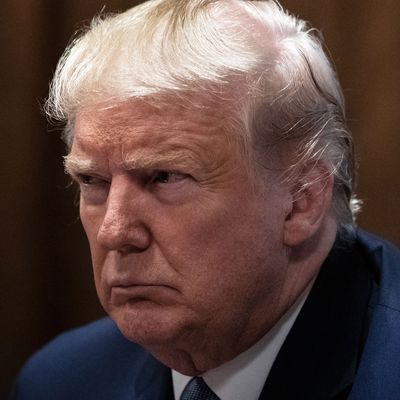
Presidential scholar Douglas Brinkley was one of more than 750 historians, including Ken Burns, Sean Wilentz, Ron Chernow, and Robert Caro, who signed an open letter this week declaring that President Trump’s actions “urgently and justly require his impeachment.” Brinkley, a professor at Rice University and regular on CNN, has written books on Jimmy Carter, Gerald Ford, Teddy Roosevelt, and edited a two volume series, The Nixon Tapes.
“I’m a student of Watergate,” Brinkley says. “I was alive and doing cable TV and journalism during Clinton’s impeachment. What I see happening with Trump seems to me far worse.”
As Congress debated impeachment this week, Brinkley made time to discuss his decision to sign the letter, the immediate and long term impact of Trump’s likely trial and whether the president will be remembered as a seminal figure or a “McCarthyism spasm.”
What went into your decision to sign the letter?
The big warning that I tell students about is George Washington’s fear of a foreign government interfering in our elections. President Trump seems to constantly be wanting to stoke that horrific act. He feels that he can get advantage by collaborating with Russia and Ukraine in unseemly ways. It’s exactly what our founders were worried about. Benjamin Franklin, in a funny speech, once talked about how the public will know – most humans will know – when a president behaves with an unacceptable obnoxiousness. We all see what Trump did with Ukraine was beyond the pale. The larger question becomes should historians be engaged in our public affairs or should we write our books and be quiet. I think these are troubled times and you need all hands on deck. Legal scholars and historians need to speak up because they’ve spent decades writing books on people like Alexander Hamilton and George Washington, or have studied Watergate closely. It’s important that they use their public voices to answer the question of whether what Trump did is impeachable or not.
How do we separate the spectacle from the substance of what we’re witnessing on a day-to-day basis?
A lot of the country is not even engaged in the impeachment debate. In many ways impeachment has kind of been a sideshow. The Mueller report was the first act of the year and impeachment the second. I think it’s only in the news media world that it’s a neon event.
This is all going to fade – America produces spectacles monthly. I think by the time of the conventions, impeachment will be a distant echo, something that happened many months ago. I don’t feel many people in the fall of 2020 are going to be voting solely on impeachment. It is a kind of dent in Trump’s armor that points to a corrupt administration. But there will be a very brisk Senate trial, and then there’s the State of the Union address and then it’s the Iowa caucus and the fight for who’s the Democratic nominee. Impeachment will rear its head from time to time. I think if Joe Biden is the Democratic nominee, Biden will stay in the news and Ukraine will continue to be part of the election 2020 cycle. But if Biden is not the nominee, the impeachment will just be a dark mark on Trump’s legacy.
What stands out so far as historically important?
The idea Trump sells that we have a deep state is going to be talked about in history a lot. It plays into conspiratorial thinking. But when the so-called deep state people came as witnesses during the Intelligence Committee, they were marvelous. They reminded us, each one of them, how many patriotic people we have in government and how we brutalize our great employees who work for low wages and are putting America’s best face forward for the world. That was the heartening moment of impeachment, to realize these types of people, like Fiona Hill, are willing to speak truth to power. Thank god we have whistleblowers and employees who care about good governance and projecting America’s image properly around the world.
What is the difference between the aftermath of Clinton’s impeachment and what will happen next to Donald Trump?
I would encourage you and any American to listen to Bill Clinton’s December 1998 apology to the nation. He took personal blame for the Lewinsky affair, asked for forgiveness, framed it as a mea culpa. He helped unite the country. He said, “I deserve some punishment. I did some things that were wrong.” Donald Trump is performing a kind of temper tantrum of defiance, which does not look good in history. It’s like George Wallace saying, “Segregation now and forever.” It might play to your base at that moment, there might be an immediate political advantage to that kind of defiance, but in the long run, Donald Trump is behaving in a dictatorial way. He doesn’t understand that a president sometimes has to say, “I made a mistake.” We’re electing human beings to the White House. Everybody makes errors and mistakes. When presidents do apologize, like Ronald Reagan during Iran Contra or Bill Clinton during impeachment, they go on to live in the annals of American greatness. Whereas Trump’s pettiness and petulance is making the presidency look small. It’s hurting America abroad.
Is there any legitimacy to the fear that this is an improper use of impeachment powers and that it’s setting a dangerous precedent going forward?
All of that is hogwash. The founders did a beautiful job of setting up impeachment principles. After all, for Congress, you’ve got to have a 50 percent bar. It is true that from time to time there may be a majority in the House who gets drunk on impeachment. But in the next phase, you need two thirds of the Senate to vote for removal. That’s a high bar to meet. Donald Trump is not going to be removed. In the end, our democracy worked because Congress was able to tarnish Trump in history, talk about his nefarious behavior and say it won’t be tolerated, and extract a political cost, while the senate says it is not enough to overturn the American public in the 2016 election. Imagine if Congress did nothing. That wouldn’t have been a way to rein in a president run amok. Nancy Pelosi did what she had to do, and this will be just a moment in American history that will be remembered as the biggest symbol of the partisan warfare that’s crippling our country right now.
What grade do you give Nancy Pelosi’s handling of the process?
A+. She’s one of the great speakers of the House. She is able to really know her caucus, know her lawmakers, and has done an amazing job of not being rattled by Trump’s childish antics. Mitch McConnell becomes a very important figure in history because of this belief he’s been executing that no matter what — you don’t abandon a president and you don’t cooperate with a Democratic president. It’s cold, it’s callous, it’s damaging to our democracy, but Mitch McConnell is a big figure in history because of the way he’s been able to unite the Republican Party behind Trumpism. Pelosi and McConnell are going to be remembered, much in the way you can’t deal with the Clinton years without remembering Newt Gingrich.
What do you think the 2020 election will mean for the way historians write about Trump?
For Donald Trump, everything is at stake. Because if he loses, he’ll be known in history as a crazy, bigoted one-term president who rained chaos on Washington for four years. He’ll be seen as a McCarthyism spasm. If he gets reelected, he reinvented the modern Republican party. He will be seen as one of the giant figures in US history who made the party of Lincoln cohere to the brand of Donald Trump. Then he does start becoming like an Andrew Jackson economic populist figure. It’s the difference between being a minor, failed one-term president or being a two-term president who reinvented the GOP. Those are very stark differences. You didn’t have that with other one-termers. With George Herbert Walker Bush, people could say, ‘Well he was only one term but, my God, the Berlin Wall came down, the Soviet Union collapsed, he won the Gulf War, we apprehended Noriega.’ You could add all of these successes. I’m afraid if Trump’s a one termer, he’s going to be remembered for his divisive politics, crazy tweets, and prejudiced language towards immigrants and people of color.
Another difference is that this election is likely going to be very close. The country is going to continue to be divided after the election.
There’s no question the division is going to continue. 2020 is not going to heal the country. However, a Trump loss may calm waters. After Watergate and Nixon we had Gerald Ford. Ford’s presidential memoir is called A Time to Heal, and then Jimmy Carter’s is called Keeping Faith. There was a period of healing faith in government for six years. If you have a Joe Biden presidency – maybe just a one term presidency – the country may calm itself and try to readjust from the populist furor of Trumpism by trying to restore some semblance of civility and bipartisanship in Washington.






























